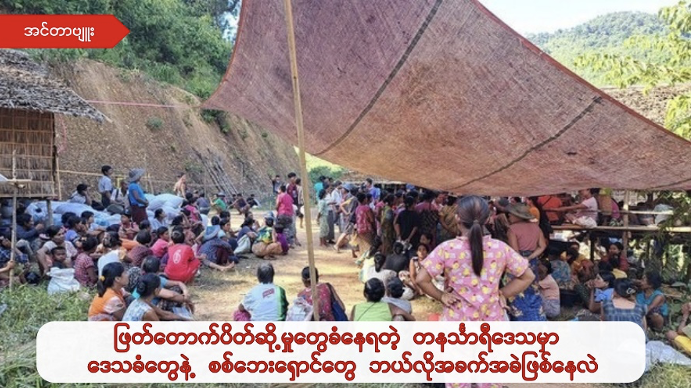An interview with a female official from the Nway Oo Myitta IDP Aid Organization about the challenges faced in assisting internally displaced persons (IDPs) in Tanintharyi Region.
Nearly four years after the military coup, local residents in Tanintharyi Region have been displaced for years due to ongoing fighting in several townships.
Furthermore, the military council has blocked key roads in the region by destroying infrastructure. As a result, displaced people are facing numerous hardships. Aid organizations assisting the IDPs are also struggling to reach and provide support to those in need.
Than Lwin Times interviewed a woman official from the Nway Oo Myitta IDP Aid Organization about how communication challenges are being addressed in a situation where roads have been destroyed and phone lines and internet connections have been cut off.
Q: First of all, could you please tell us about the current situation of the IDPs in Tanintharyi Township?
A: The situation of IDPs has become more difficult than before. There are no longer any monthly donors. Previously, there were groups that contributed online or through our page, as well as other donors. Donations received through the Nway Oo Myitta page were then distributed to the IDPs. Currently, we are unable to operate due to the lack of donors. As a result, the absence of these groups is directly impacting the IDPs.
Q: What is the number of IDPs at the Nway Oo Myitta displacement camp, and what are their main needs?
A: The number of IDPs is approximately 1,200. They have many needs, much like any household. The IDPs need everything from head to toe and clothes.
Q: On the other hand, as the battles in Tanintharyi Township have eased somewhat, what is the situation regarding the possibility of some IDPs returning home?
A: All the villagers here have been forced to flee. When the fighting subsides, they may be able to return to their villages. This is why we don’t consider them permanent IDPs. We categorize IDPs into two groups: those who are temporarily displaced due to the conflict are called temporary IDPs. However, many IDPs are not allowed to return to their villages because junta soldiers conduct checks along the way. For various reasons, many homes have been burned down. If they cannot return home within three months, they are considered permanent IDPs. Those who are unable to return at all are designated as permanent IDPs. Therefore, we classify IDPs into two types.
Q: The IDPs are classified into permanent and temporary categories. At present, are the temporary IDPs able to return home?
A: Currently, there are no temporary IDPs because there is no active fighting. However, there are permanent IDPs. All the residents of Banlaw village have fled and are unable to return to their village, which has been severely damaged. In the recent fighting in Banlaw, Banlin, and Thameehla villages, the junta set fire to homes and arrested civilians. As a result, the villagers are too afraid to return, even though there is no ongoing fighting. They are forced to seek shelter elsewhere.
Q: What difficulties are you facing due to the phone and internet blackouts in Tanintharyi Township?
A: This situation makes it very difficult for those working on IDP affairs, as they can only communicate about the conditions of the IDPs when they have access to phone and internet lines. It’s challenging for us to express our difficulties through the media under these circumstances. These issues have direct, step-by-step impacts on the IDPs. Due to phone and internet outages, the media is unable to cover the news of our plight, and we are unable to operate effectively through our page. As a result, no donors are able to reach us, which further affects the IDPs.
Q: Currently, the military council has begun destroying village-to-village roads by placing earth mounds and digging trenches. What kind of difficulties are the locals facing as a result?
A: Now that the military council has blocked and closed the roads, children from this village are unable to attend school. Parents have stopped sending their children due to rumors that landmines or explosive devices have been planted in areas where soil has been piled up. The military council has also restricted the purchase of rice and other essential food items. People are only allowed to buy rice for a week at a time, and they must show their household information to do so. Clinics are nearby when they enter the village. Due to these numerous restrictions, the locals are unable to go anywhere, facing challenges in terms of the economy, healthcare, and education. This is their first experience of such a war; we had to endure similar hardships earlier in Taku and Thar Ra Wa.
Q: Another issue is that the military council has implemented a four-cuts strategy in Tanintharyi Township and has blocked village-to-village roads. Given these challenges, what is the next step for the IDP aid organization?
A: In the past, we were able to carry small amounts of medicine and rations without issue. Now, however, the junta has tightened inspections, and travelers are not allowed to carry large bags. We have to carefully collect and store medicine in anticipation of potential outbreaks, trying to predict which diseases might occur in which months. This has been exhausting. We’re also in a difficult position if we run out of essential supplies like rice, cooking oil, and salt. Collecting these items has become more challenging than before.
Q: Finally, is there anything else you would like to add?
A: We are facing a major weakness due to the phone and internet blackouts, which has left those working for the IDPs feeling exhausted. Despite this, we have not removed our Nway Oo Myitta page—it remains active and truly exists. However, due to the internet outages, we have been unable to upload new posts, and we no longer have donors. We would like to encourage potential donors to contact us through our page.
Sent by Than Lwin Times

